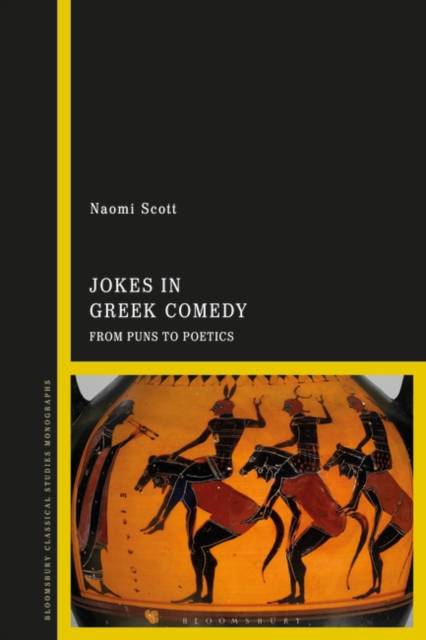
Je cadeautjes zeker op tijd in huis hebben voor de feestdagen? Kom langs in onze winkels en vind het perfecte geschenk!
- Afhalen na 1 uur in een winkel met voorraad
- Gratis thuislevering in België vanaf € 30
- Ruim aanbod met 7 miljoen producten
Je cadeautjes zeker op tijd in huis hebben voor de feestdagen? Kom langs in onze winkels en vind het perfecte geschenk!
- Afhalen na 1 uur in een winkel met voorraad
- Gratis thuislevering in België vanaf € 30
- Ruim aanbod met 7 miljoen producten
Zoeken
Omschrijving
In ancient Greek comedy, nothing is ever 'just a joke'. This book treats jokes with the seriousness they deserve, and shows that far from being mere surface-level phenomena, jokes in Greek comedy are in fact a site of poetic experimentation whose creative force expressly rivals that of serious literature.
Focusing on the fragments of authors including Cratinus, Pherecrates, and Archippus alongside the extant plays of Aristophanes, Naomi Scott argues that jokes are critical to comedy's engagement with the language and convention of poetic representation. More than this, she suggests that jokes and poetry share a kind of kinship as two modes of utterance which specifically set out to flout the rules of ordinary speech. Starting with bad puns, and taking in crude slapstick, vulgar innuendo and frivolous absurdism, Jokes in Greek Comedy demonstrates that the apparently inconsequential jokes which pepper the surface of Greek comedy in fact amplify the impossible and defamiliarizing qualities of standard poetic practice, and reveal the fundamental ridiculousness of treating make-believe as a serious endeavour. In this way, jokes form a central part of Greek comedy's contestation of the role of language, and particularly poetic language, in the truthful representation of reality.
Focusing on the fragments of authors including Cratinus, Pherecrates, and Archippus alongside the extant plays of Aristophanes, Naomi Scott argues that jokes are critical to comedy's engagement with the language and convention of poetic representation. More than this, she suggests that jokes and poetry share a kind of kinship as two modes of utterance which specifically set out to flout the rules of ordinary speech. Starting with bad puns, and taking in crude slapstick, vulgar innuendo and frivolous absurdism, Jokes in Greek Comedy demonstrates that the apparently inconsequential jokes which pepper the surface of Greek comedy in fact amplify the impossible and defamiliarizing qualities of standard poetic practice, and reveal the fundamental ridiculousness of treating make-believe as a serious endeavour. In this way, jokes form a central part of Greek comedy's contestation of the role of language, and particularly poetic language, in the truthful representation of reality.
Specificaties
Betrokkenen
- Auteur(s):
- Uitgeverij:
Inhoud
- Aantal bladzijden:
- 192
- Taal:
- Engels
Eigenschappen
- Productcode (EAN):
- 9781350248489
- Verschijningsdatum:
- 19/10/2023
- Uitvoering:
- Hardcover
- Formaat:
- Genaaid
- Afmetingen:
- 156 mm x 234 mm
- Gewicht:
- 449 g

Alleen bij Standaard Boekhandel
+ 390 punten op je klantenkaart van Standaard Boekhandel
Beoordelingen
We publiceren alleen reviews die voldoen aan de voorwaarden voor reviews. Bekijk onze voorwaarden voor reviews.









